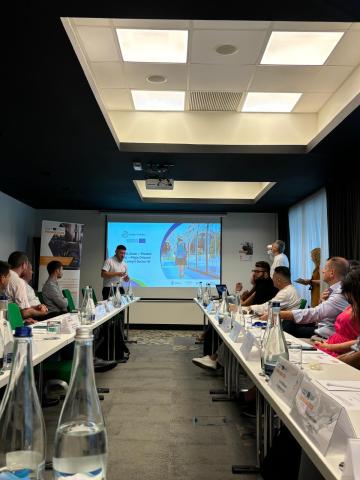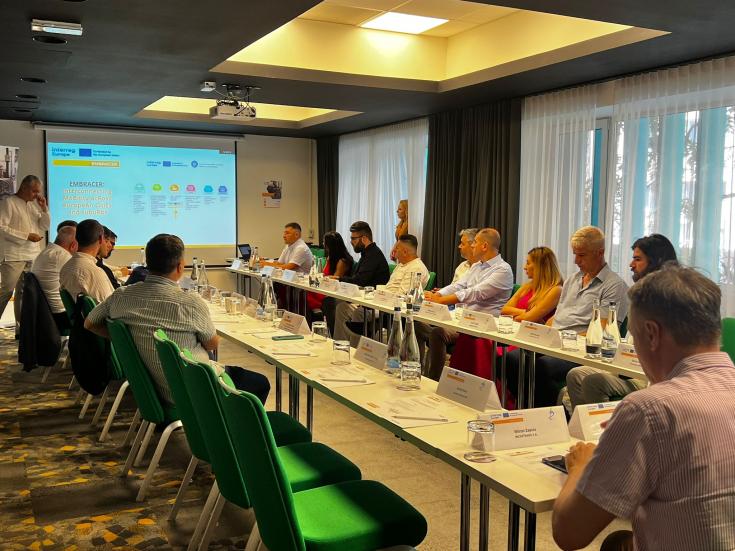Third stakeholder meeting in the Bucharest-Ilfov Region
The Bucharest-Ilfov Regional Development Agency (BIRDA) organized the third EMBRACER Regional Stakeholder Group Meeting on the 18th of July 2024, in Bucharest, at Park Inn Hotel. The event brought together 26 representatives from central and local public institutions in the Bucharest-Ilfov region, as well as from academia, research and civil society, all focused on sustainable and intelligent mobility.
The main focus of the event was to share updates and explore innovative solutions learned during the staff exchange program (organized by BIRDA and the University of Aveiro in Bucharest in May 2024), which focused on presenting the development of intermodal mobility and alternatives to ensure connectivity between urban and lower-density communities.
The meeting started with a comprehensive overview of the current state of the EMBRACER project, followed by key insights, experiences and lessons learned from the staff exchange program.
The case study related to the Metro Mondego from the Coimbra Region was disseminated among the regional stakeholders, with clear technical details on how the region addressed the challenges of operating in hilly or remote areas and how it was possible to link the new infrastructure with the already developed public transport network in order to ensure a sustainable mobility solution for the Coimbra Region.
Furthermore, during the meeting, the following relevant information was presented:
- The Association of Sustainable Fuels presented a comprehensive material showcasing the need for solutions to promote a new integrated urban climate. Among the key aspects presented, we are mentioning: the legislation for green regional development, the publication of new green public procurement guide and the sustainable financing in line with DNSH principle.
- F.I.P. Consulting shared their experience obtained during the development of the Velo Master Plan for Bucharest - a significant document for the sustainable mobility in the Bucharest-Ilfov region. They presented conclusions related to: the main proposals for bicycle routes that will be integrated into the transport infrastructure of Bucharest; the principle of establishing the median ring as the main highway taking into account the degree of bicycle use at city level; the proposals to develop tourist cycle routes as mentioned in the annex of the Velo Master Plan. Also, the concept of the green school, which promotes cycling to school among pupils and provides adequate bicycle parking spaces, was discussed at the event. The importance of educating children on the proper use of bicycles and their health benefits were also highlighted.
- The representatives of the 6th District City Hall shared their experience gained through the implementation of the "Coding the Curbs" project, which had as a main objective the creation of two smart zone parking spaces in a residential area. The utility of this smart parking was demonstrated by the high number of uses, especially in working days, which led to the development of another project submitted for financing by the 6th District City Hall.

The conclusions of the event highlighted the following:
• The need for substantial change in the transport systems to meet sustainability criteria (dimensioning the transport infrastructure, implementing different types of parking, educating the community, extending the tram lines in the peri-urban areas, implementing new optimization criteria, creating intermodal connection spaces to choose from different types of transport). Critical infrastructure related to energy and transport must be modernized.
• The need for a stronger symbiosis between the main actors within the regional mobility sector, the Ministry of Transport, Metrorex – the Bucharest metro service, Districts’ City Halls from Bucharest, City Hall of Bucharest, local and regional public transport actors.
• Supporting activities to educate and raise awareness of the population for the use of public transport.
• Promoting an open communication process between different local actors for the efficiency of implemented projects.
• A key point emphasized during the discussion was the importance of collaboration among local entities, particularly in smaller areas. Effective cooperation between municipalities, transport operators, and other stakeholders is essential for the successful implementation of integrated mobility solutions. Such collaboration can result in more coordinated and efficient transportation systems that better serve the community's needs.
